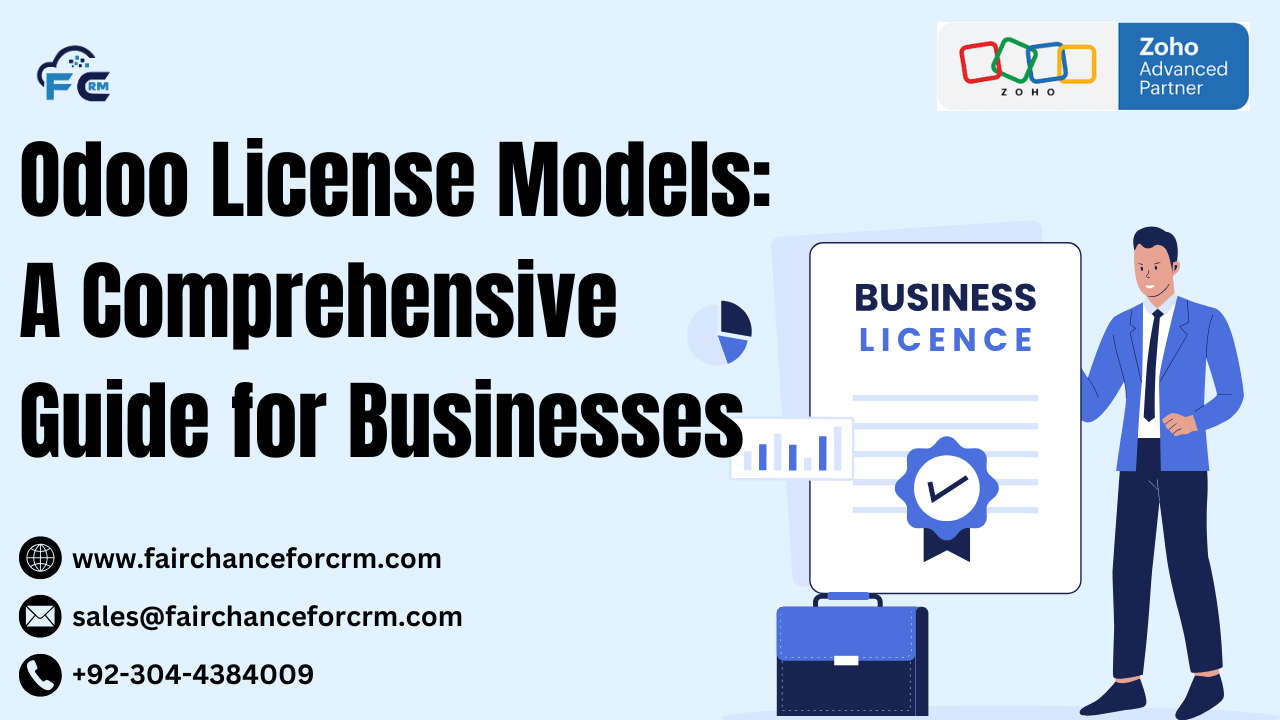Odoo License Models is today our topic. Odoo is a leading enterprise resource planning (ERP) software that offers a comprehensive suite of business applications, including tools for sales, finance, inventory management, human resources, and more. With a vast user base ranging from small businesses to large enterprises, Odoo’s flexibility and scalability are some of its strongest points. However, to effectively utilize Odoo, users need to understand the various licensing options available.
Also Read:
- Odoo Immobilisation (Asset Management) By FAIRCHANCE FOR CRM
- Odoo Framework By FAIRCHANCE FOR CRM
- Odoo Editions By FAIRCHANCE FOR CRM
- ERP Solutions With Expert Insights From Fairchance For CRM
- Empower Business Finances: Unveiling the Magic of Zoho Books
What is Odoo License?
Odoo is an open-source ERP platform that allows businesses to manage and automate their business processes. It offers a wide range of integrated applications, including modules for accounting, inventory, sales, project management, manufacturing, human resources, and CRM. Odoo is known for its modular structure, allowing users to install only the applications they need.
Odoo’s open-source version is free, but there are also enterprise versions with additional features, support, and services. It is important for businesses to choose the correct license for their specific needs to ensure they get the right functionality and support.
Types of Odoo Licenses
There are two main types of Odoo licenses:
- Odoo Community License:
- Open Source (GPLv3): The Odoo Community edition is released under the GNU General Public License version 3 (GPLv3). This is a free, open-source version of the software.
- Limited Features: While the community edition includes many core functionalities (like sales, inventory, and accounting), it lacks advanced features and tools that are part of the Odoo Enterprise edition.
- Customization: Users can modify and customize the Community edition to suit their needs without restrictions.
- Support: There is no official support for the Community edition, though a large community of developers provides forums, documentation, and other resources.
- Odoo Enterprise License:
- Paid Version: Odoo Enterprise is a subscription-based offering. Businesses must purchase a license to access this version of the software.
- Additional Features: Odoo Enterprise offers more features and modules that are not available in the Community edition, including advanced tools for project management, HR, manufacturing, marketing, and more.
- Technical Support: With an Odoo Enterprise license, users receive official support from Odoo’s team of experts.
- Cloud Hosting Options: Odoo Enterprise can be hosted on Odoo’s cloud or on private servers, giving businesses more flexibility in their deployment options.
- Customizable: Odoo Enterprise allows businesses to further customize and integrate their ERP solution as needed.
Key Differences Between Odoo Community and Odoo Enterprise
| Feature | Odoo Community | Odoo Enterprise |
|---|---|---|
| License Type | Free, open-source (GPLv3) | Paid subscription, proprietary license |
| Features | Core ERP modules (e.g., CRM, Sales, Inventory) | Full suite of features (HR, Manufacturing, Marketing, etc.) |
| Support | Community support (forums, documentation) | Official support from Odoo |
| Upgrades | Manual upgrades via community | Automatic upgrades, priority access |
| Customization | Full customization without restrictions | More customization with official support |
| Cloud Hosting | Requires self-hosting or third-party hosting | Available on Odoo’s cloud or self-hosting |
Odoo Enterprise Pricing
The pricing structure for Odoo Enterprise is based on the number of users and the number of modules used by the business. The cost of the license is typically calculated per user and module. Below is a breakdown of how pricing works:
- Per User: Odoo Enterprise pricing is typically based on a per-user subscription model. The more users you have in your organization, the higher the cost.
- Modules: Odoo Enterprise’s pricing also depends on the modules you use. Each module (e.g., sales, CRM, inventory) has an associated cost.
- Hosting Costs: If you choose Odoo’s cloud hosting, the hosting charges will be added on top of the license fee. Odoo offers scalable cloud hosting plans.
- Additional Costs: Additional services, such as customization, training, and integration with other systems, may involve additional fees.
Benefits of Odoo Enterprise License
- Extended Functionality: Odoo Enterprise provides advanced features that are not available in the Community edition, such as detailed reporting, marketing automation, and advanced security.
- Cloud Hosting: With Odoo Enterprise, businesses can opt for Odoo’s cloud hosting solution, ensuring secure and reliable infrastructure.
- Priority Support: Odoo Enterprise users receive priority support, making it easier to resolve any technical issues or questions.
- Frequent Updates: Odoo Enterprise benefits from regular updates, ensuring the software remains up-to-date with the latest features and security patches.
- Customization and Integration: The Enterprise version allows businesses to integrate Odoo with other software applications and customize the ERP system according to their specific needs.
Choosing the Right Odoo License for Your Business
When deciding between the Community and Enterprise editions, businesses need to consider their specific needs, budget, and requirements. The Odoo Community edition is ideal for small businesses or those with a tight budget that can do without the advanced features and support. On the other hand, businesses that require robust functionality, scalability, and official support should consider the Odoo Enterprise license.
Factors to consider:
- Size of Your Organization: Larger companies often require the advanced features available in Odoo Enterprise, while smaller organizations might be able to get by with the Community edition.
- Budget: Odoo Enterprise requires a subscription, which may be a significant cost for small businesses, whereas the Community edition is free.
- Technical Resources: If your business has a strong technical team, the Community edition may be sufficient. However, if you need guaranteed support and updates, the Enterprise edition is better suited.
- Customizations and Integrations: If you need extensive customizations and integrations, the Enterprise version might be more flexible and provide official support.
Conclusion
Odoo offers two primary licensing options: Community and Enterprise. The Community edition is open-source and free, making it a good option for small businesses with basic ERP needs. The Enterprise edition, however, is subscription-based and offers more advanced features, official support, and cloud hosting options, making it suitable for larger organizations or those looking for additional functionality and technical assistance.
Choosing the right license depends on several factors, including the size of your business, budget, required features, and level of support needed. Odoo’s scalability and modular nature allow businesses of all sizes to adopt and benefit from the ERP system, whether they opt for the Community edition or the full-featured Enterprise edition.
For more information about the Understanding Odoo License, visit this link.
If you want to Free Trail Zoho, click on this link.




